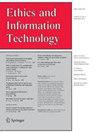我们应该拥抱“大姐”吗?智能音箱是对抗亲密伴侣暴力的一种手段
IF 3.4
2区 哲学
Q1 ETHICS
引用次数: 0
摘要
据估计,三分之一的女性在其一生中经历过亲密伴侣暴力(IPV)。由复杂人工智能驱动的“智能扬声器”的普及意味着对国内环境进行监控的可能性越来越大。相应地,使用智能音箱检测或报告IPV的建议也多种多样。在本文中,我们阐明了使用现有或近期技术打击IPV的可能性,并开始了从道德和政治上评估该项目的项目。我们认为,根据人们是在考虑开发技术的决定还是在技术开发后使用它的决定,伦理前景看起来会有所不同。如果活动家和政府希望避免IPV反应的私有化,家庭空间无处不在的监视,增加警察对IPV反应对少数民族社区成员构成的风险,以及更强大的智能扬声器将被男性用来控制和虐待女性的危险,那么他们应该抵制这项技术的发展,而不是等到这些系统被开发出来。如果判断IPV的道德紧迫性证明了通过开发这项技术探索可能的可能性是合理的,即使面对这些风险,那么来自各种人口统计数据的受害者-幸存者,以及政府和非政府利益相关者,都必须参与塑造这项技术以及监管它所需的立法和政策。本文章由计算机程序翻译,如有差异,请以英文原文为准。
Should we embrace “Big Sister”? Smart speakers as a means to combat intimate partner violence
Abstract It is estimated that one in three women experience intimate partner violence (IPV) across the course of their life. The popular uptake of “smart speakers” powered by sophisticated AI means that surveillance of the domestic environment is increasingly possible. Correspondingly, there are various proposals to use smart speakers to detect or report IPV. In this paper, we clarify what might be possible when it comes to combatting IPV using existing or near-term technology and also begin the project of evaluating this project both ethically and politically. We argue that the ethical landscape looks different depending on whether one is considering the decision to develop the technology or the decision to use it once it has been developed. If activists and governments wish to avoid the privatisation of responses to IPV, ubiquitous surveillance of domestic spaces, increasing the risk posed to members of minority communities by police responses to IPV, and the danger that more powerful smart speakers will be co-opted by men to control and abuse women, then they should resist the development of this technology rather than wait until these systems are developed. If it is judged that the moral urgency of IPV justifies exploring what might be possible by developing this technology, even in the face of these risks, then it will be imperative that victim-survivors from a range of demographics, as well as government and non-government stakeholders, are engaged in shaping this technology and the legislation and policies needed to regulate it.
求助全文
通过发布文献求助,成功后即可免费获取论文全文。
去求助
来源期刊

Ethics and Information Technology
Multiple-
CiteScore
8.20
自引率
5.60%
发文量
46
期刊介绍:
Ethics and Information Technology is a peer-reviewed journal dedicated to advancing the dialogue between moral philosophy and the field of information and communication technology (ICT). The journal aims to foster and promote reflection and analysis which is intended to make a constructive contribution to answering the ethical, social and political questions associated with the adoption, use, and development of ICT. Within the scope of the journal are also conceptual analysis and discussion of ethical ICT issues which arise in the context of technology assessment, cultural studies, public policy analysis and public administration, cognitive science, social and anthropological studies in technology, mass-communication, and legal studies.
 求助内容:
求助内容: 应助结果提醒方式:
应助结果提醒方式:


